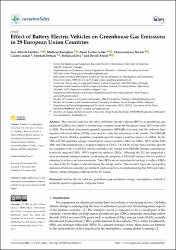Effect of Battery Electric Vehicles on Greenhouse Gas Emissions in 29 European Union Countries

Göster/
Tarih
2021Yazar
Fuinhas, Jose AlbertoKoengkan, Matheus
Leitao, Nuno Carlos
Nwani, Chinazaekpere
Uzuner, Gizem
Dehdar, Fatemeh
Relva, Stefania
Peyerl, Drielli
Üst veri
Tüm öğe kaydını gösterÖzet
This analysis explored the effect of battery electric vehicles (BEVs) on greenhouse gas
emissions (GHGs) in a panel of twenty-nine countries from the European Union (EU) from 2010
to 2020. The method of moments quantile regression (MM-QR) was used, and the ordinary least
squares with fixed effects (OLSfe) was used to verify the robustness of the results. The MM-QR
support that in all three quantiles, economic growth causes a positive impact on GHGs. In the
50th and 75th quantiles, energy consumption causes a positive effect on GHGs. BEVs in the 25th,
50th, and 75th quantiles have a negative impact on GHGs. The OLSfe reveals that economic growth
has a negative effect on GHGs, which contradicts the results from MM-QR. Energy consumption
positively impacts GHGs. BEVs negatively impacts GHGs. Although the EU has supported a
more sustainable transport system, accelerating the adoption of BEVs still requires effective political
planning to achieve net-zero emissions. Thus, BEVs are an important technology to reduce GHGs
to achieve the EU targets of decarbonising the energy sector. This research topic can open policy
discussion between industry, government, and researchers, towards ensuring that BEVs provide a
climate change mitigation pathway in the EU region.
Cilt
13Sayı
24Bağlantı
https://hdl.handle.net/11363/5317Koleksiyonlar
Aşağıdaki lisans dosyası bu öğe ile ilişkilidir:

















